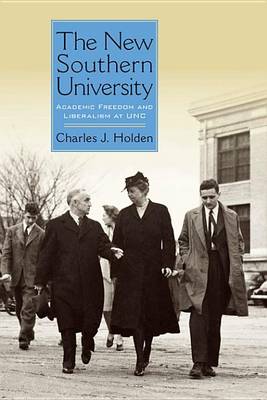New Directions in Southern History
1 total work
The creation of the "modern university" dates back to the early 1900s when American professors fashioned for their institutions a mission of social service and defined themselves as truth-seekers whose expertise would bring social benefits. These academics also introduced a new idea to the American public: academic freedom. In 1925, University of North Carolina President Harry Woodburn Chase proclaimed, "What the university believes with all its heart, is that a teacher has a right to state the honest conviction to which he has come through his work, that he has the right of freedom of speech in teaching just as any other citizen has that right under the constitution." The forging of this new identity and the introduction of academic freedom did not come without internal and external struggles, however. Perhaps in no other region was the university-trained intellectual's new identity met with more suspicion and scrutiny than in the South, a region historically resistant to change.
A close examination of one of the leading southern universities, the University of North Carolina at Chapel Hill (UNC), during these years reveals the ambitions of this new generation of professors, the reactionary logic of their critics, and the confused attempts of school leaders to use academic freedom to help the school navigate through these transformative decades. Between world wars, UNC emerged as a modern university that championed academic freedom and the expertise of its faculty. This expertise would, in theory, help lift the state and indeed the entire South out of poverty and place it on the road to progress. From the outset, university leaders understood that explaining and defending academic freedom was the key to gaining public support, thereby setting an example for other southern universities. In To Carry the Truth: Academic Freedom at UNC, 1920-1941, Charles J. Holden examines academic freedom through a contextualized intellectual history of the movement's origin at one school. Holden explores how academic freedom worked over time and reveals the fault lines between the goals of academic freedom and what was really possible.
To Carry the Truth will be of interest to historians of higher education, of the South, and of the law. This project is being considered for UPK's New Directions in Southern History series. Charles J. Holden is Aldom-Plansoen Distinguished Professor of history at St. Mary's College of Maryland. He is the author of In the Great Maelstrom: Conservatives in Post-Civil War South Carolina (South Carolina) and has contributed to several other publications, including North Carolina Historical Review and Maryland Historical Magazine.
A close examination of one of the leading southern universities, the University of North Carolina at Chapel Hill (UNC), during these years reveals the ambitions of this new generation of professors, the reactionary logic of their critics, and the confused attempts of school leaders to use academic freedom to help the school navigate through these transformative decades. Between world wars, UNC emerged as a modern university that championed academic freedom and the expertise of its faculty. This expertise would, in theory, help lift the state and indeed the entire South out of poverty and place it on the road to progress. From the outset, university leaders understood that explaining and defending academic freedom was the key to gaining public support, thereby setting an example for other southern universities. In To Carry the Truth: Academic Freedom at UNC, 1920-1941, Charles J. Holden examines academic freedom through a contextualized intellectual history of the movement's origin at one school. Holden explores how academic freedom worked over time and reveals the fault lines between the goals of academic freedom and what was really possible.
To Carry the Truth will be of interest to historians of higher education, of the South, and of the law. This project is being considered for UPK's New Directions in Southern History series. Charles J. Holden is Aldom-Plansoen Distinguished Professor of history at St. Mary's College of Maryland. He is the author of In the Great Maelstrom: Conservatives in Post-Civil War South Carolina (South Carolina) and has contributed to several other publications, including North Carolina Historical Review and Maryland Historical Magazine.
